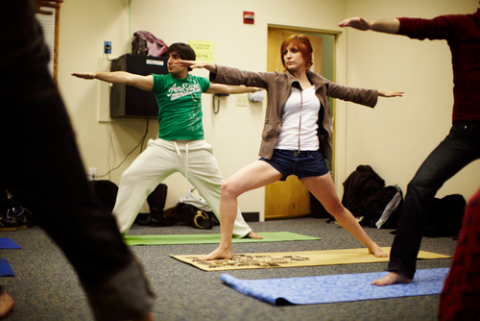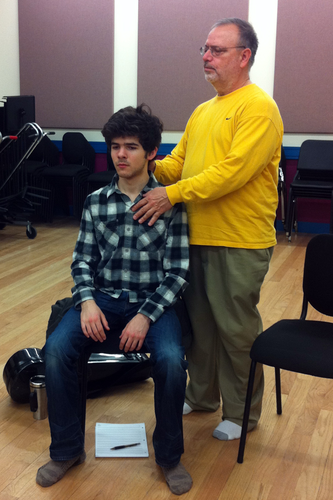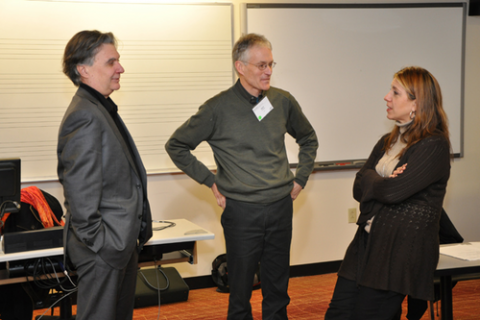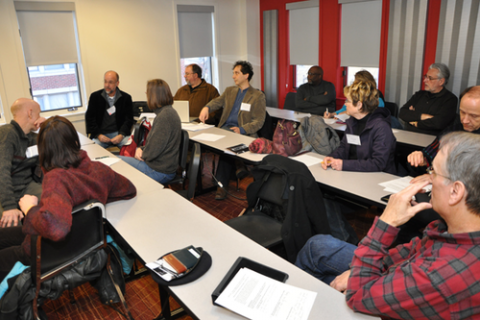No More Playing through the Pain

Mia Olson's Yoga for Musicians class pulls students out of their normal postures.
Photo by Christian Kozowyk

Bob Lada adjusts student Alex Hargreaves's posture in Awareness Training for Musicians.
Photo by Deanna Choi

Performance Division dean Matt Marvuglio, Neil Olmstead, and Jeannie Gagné chat at the BTOT session.
Photo by Phil Farnsworth

Faculty discuss performance injuries at BTOT.
Photo by Phil Farnsworth
Seventy-one percent of Berklee students surveyed in 2010 reported pain, numbness, or discomfort related to practicing their instrument. In order to be masters of their craft, students practice for hours each day—in addition to classes, ensembles, and private lessons—and that much playing can lead to serious injuries. Many believe that there's nothing they can do about such pain, and just grit their teeth and stick it out. But a group of professors is trying to change that perception, with a new Performance Wellness Institute that helps faculty help students.
The directors of the institute, piano faculty Neil Olmstead and voice faculty Jeannie Gagné, conducted both this survey and another in 2009. Olmstead and Gagné offered a presentation at the Berklee Teachers on Teaching (BTOT) conference in January to share their findings.
Fortunately, most students reported "uncomfortable minor pain," rather than "intense pain." Vocalists and guitarists suffer the most, followed by pianists and percussionists. For instrumentalists, common issues are tendonitis, carpal tunnel syndrome, and back pain. Problems for vocalists include respiratory illnesses, acid reflux, and vocal chord nodules. Even students in "nonperformance" majors are affected. "I don't know a single music therapist who doesn't have use-related injuries. In making music with our clients, it's often necessary to assume unusual positions for extended periods of time: bending over beds, crawling along floors, helping people out of chairs, bending over guitars," says music therapy faculty Donna Chadwick.
Many of those who attended the presentation have had injuries of their own that prompted their interest in the subject, including Olmstead himself.
"I was treating my thumb aggressively and poorly," says Olmstead. "You can really bang your thumb into a key to the point where you're getting a lot of pain." To address this, Olmstead studied with master pianist Burton Hatheway and—at the age of 51—changed his technique.
Over decades of playing, many performers adjust their technique to prevent injury. The goal is to encourage students to become aware of the issue early on, so they can have long-term, sustainable careers instead of burning out.
Student pianist Gonzalo Iturriaga developed tendonitis last semester while practicing simultaneously for a recital and an audition for the Berklee Global Jazz Institute Orange Ensemble. "I spent two days in the practice room not caring much about my body. After a while my right elbow started hurting a lot. And then I had to play in both my audition and the recital with the injury," says Iturriaga.
Olmstead and fellow piano faculty Doug Johnson gave the junior advice that changed his perspective on performance.
"The most groundbreaking thing for my playing is just generally trying to be more aware of my entire body, because it's easy to lose awareness of your upper body. The weight of my head and my shoulders doesn't necessarily have to be a weight that gets in the way of my playing," says Iturriaga.
Vocalists have a different experience than instrumentalists, because their instrument is their body. Berklee's Voice Department encourages them to learn more about it, so they can treat it well.
"There's a lot of energy around teaching much more anatomy," says Gagné, "so students really have a working knowledge of exactly what's happening in the body, not just 'drink tea, don't smoke,' but 'this is what's happening inside your larynx.'"
In the past, Berklee's performance wellness offerings were on a more individual basis, as faculty with a reputation as "technique people" were referred students with injuries. But some new performance study health (PSH) courses take aim at whole body awareness, such as Awareness Training for Musicians, Somatic Breathwork for Vocalists, Yoga for Musicians, Qigong for Musicians, and Integral Tai Chi. In addition, the Student Activities Office's LiveWell program brings in experts on the Alexander Technique, the Feldenkrais Method, meditation, and more.
The Performance Wellness Institute's aim is to collect information in a more formal way, educate more faculty on the problems, and provide them with resources that they can pass on to their students. Future possibilities include a minor in performance study health.
Of course, serious injuries are referred to Boston's renowned hospitals, but the goal is to address problems early, to prevent them from developing that far.
None of this is should limit students' creativity or skill—in fact, it's supposed to increase it. "No question about it, it's made my improvisation much more fluid and easy," says Olmstead. "It's not just repairing a problem; it's actually really improving your musical output."
Related articles:
